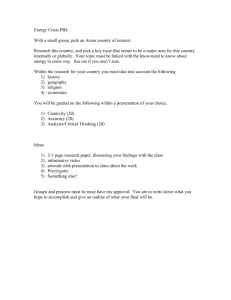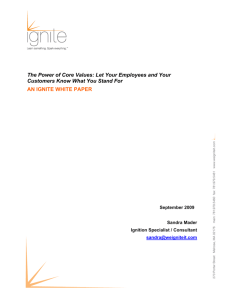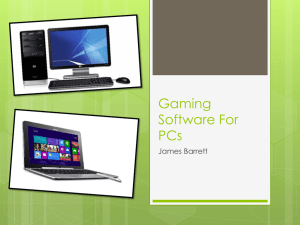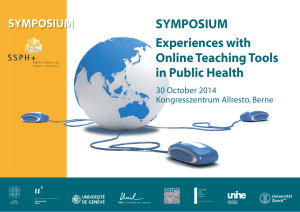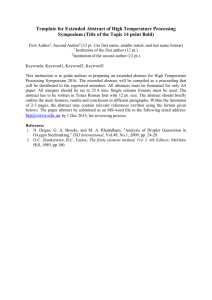Exploring Our Future in an Urbanized World
advertisement
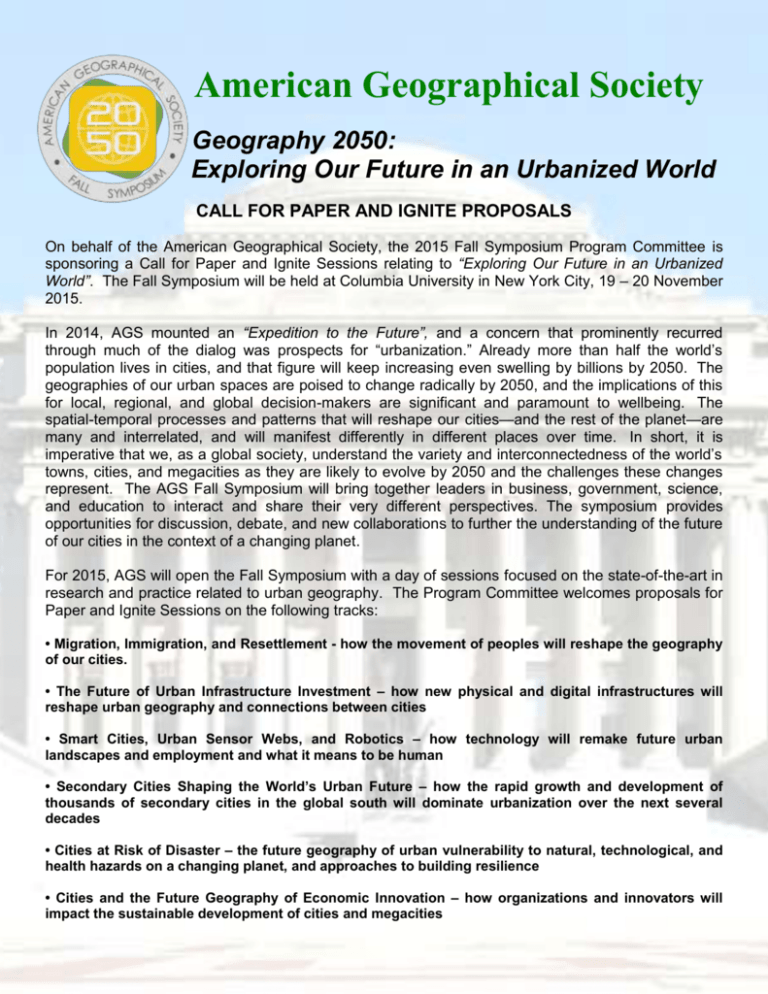
American Geographical Society Geography 2050: Exploring Our Future in an Urbanized World CALL FOR PAPER AND IGNITE PROPOSALS On behalf of the American Geographical Society, the 2015 Fall Symposium Program Committee is sponsoring a Call for Paper and Ignite Sessions relating to “Exploring Our Future in an Urbanized World”. The Fall Symposium will be held at Columbia University in New York City, 19 – 20 November 2015. In 2014, AGS mounted an “Expedition to the Future”, and a concern that prominently recurred through much of the dialog was prospects for “urbanization.” Already more than half the world’s population lives in cities, and that figure will keep increasing even swelling by billions by 2050. The geographies of our urban spaces are poised to change radically by 2050, and the implications of this for local, regional, and global decision-makers are significant and paramount to wellbeing. The spatial-temporal processes and patterns that will reshape our cities—and the rest of the planet—are many and interrelated, and will manifest differently in different places over time. In short, it is imperative that we, as a global society, understand the variety and interconnectedness of the world’s towns, cities, and megacities as they are likely to evolve by 2050 and the challenges these changes represent. The AGS Fall Symposium will bring together leaders in business, government, science, and education to interact and share their very different perspectives. The symposium provides opportunities for discussion, debate, and new collaborations to further the understanding of the future of our cities in the context of a changing planet. For 2015, AGS will open the Fall Symposium with a day of sessions focused on the state-of-the-art in research and practice related to urban geography. The Program Committee welcomes proposals for Paper and Ignite Sessions on the following tracks: • Migration, Immigration, and Resettlement - how the movement of peoples will reshape the geography of our cities. • The Future of Urban Infrastructure Investment – how new physical and digital infrastructures will reshape urban geography and connections between cities • Smart Cities, Urban Sensor Webs, and Robotics – how technology will remake future urban landscapes and employment and what it means to be human • Secondary Cities Shaping the World’s Urban Future – how the rapid growth and development of thousands of secondary cities in the global south will dominate urbanization over the next several decades • Cities at Risk of Disaster – the future geography of urban vulnerability to natural, technological, and health hazards on a changing planet, and approaches to building resilience • Cities and the Future Geography of Economic Innovation – how organizations and innovators will impact the sustainable development of cities and megacities • Marginalization and Integration – the geography of identity and inequality in future urban habitats • Urban Communities, Safety, and Health – how place-based investment, governance, and community participation will shape the urban geography of human security and public health • Urban Culture, Attitudes, and Demography – how demographic and social trends, coupled with economic and technological change, may lead to new approaches to urban life and sustainability Timetable 11 May 2015 12 May – 14 June 2015 15 June 2015 2 November 2015 19 November 2015 Deadline for paper and ignite talk proposals Review of proposals Notification of acceptance/rejection of proposals Deadline for final presentations to be received by AGS Paper and ignite talks at Symposium Submissions By 11 May 2015, authors should submit a one to two page proposal for their paper or Ignite Session including the title, suggested track, a short description of the topic(s) to be addressed, and the approach that will be taken. Proposals, along with authors’ contact information, should be submitted via e-mail to AGS at symproposals@americangeo.org. Please put "Symposium Proposal" in the subject line. For more information on Paper and Ignite Talk Proposals, please contact: submissions@geography2050.org Papers the Symposium Proceedings. Choosing to publish an Ignite Talks Manuscripts addressing substantive or theoretical topics are sought for competitive paper sessions. For all accepted paper sessions, it is mandatory that at least one author of the paper register, and present the paper at, the Symposium. Submission of the same, or substantially overlapping, manuscript(s) to multiple tracks is not permitted. Papers that are accepted must be submitted electronically in Microsoft Word no later than 2 November 2015. Any slides that will be used in the presentation at the Symposium must also be submitted electronically in PowerPoint no later than 2 November 2015. Submitted papers - including references, exhibits, and appendices - must not exceed 20 double-spaced, word-processed pages prepared in 12-point font and a standard one-inch margin. Papers cannot exceed this limit. Authors of accepted competitive papers have the option of publishing either an extended abstract or full paper in Extended Abstract gives authors the option to submit the paper elsewhere for publication after the Symposium. Ignite talks contributing to theory and practice are solicited. Ignite talks consist of exactly 20 sides each on the screen for exactly 15 seconds. Thus, each presentation lasts 5 minutes. It is mandatory that at least one author of the Ignite session register for, and give the presentation at, the conference. Submission of the same, or substantially overlapping, presentation(s) to multiple tracks is not permitted. Ignite talks that are accepted must be submitted electronically in PowerPoint no later than 2 November 2015. Submitted Ignite presentations - including any title slide - must be exactly 20 slides. Any submissions not containing exactly 20 slides will be rejected. In addition to the slides themselves, accepted Ignite talks will require a synopsis of the slide show. The synopsis should be between 1 to 4 sentences per slide. Note that accepted Ignite presentations will be included in the Symposium Proceedings www.geography2050.org
